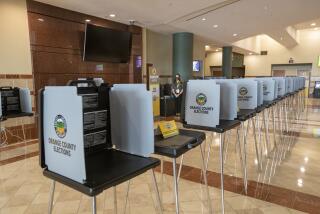Money for nothing
- Share via
EVEN MORE NEWSWORTHY than a man biting a dog is a political candidate turning down money from the U.S. Treasury. Yet it’s possible that, next year, both major party nominees for president will decline to accept about $80 million in federal funds generated by a taxpayer checkoff, confident that they can raise more on their own.
Seemingly resigned to this break with three decades of tradition, campaign reformers are seeking swift congressional action on a more generous system of public financing for the 2012 presidential election. But the reformers, led by Sen. Russell D. Feingold (D-Wis.), the co-sponsor of the 2002 McCain-Feingold campaign finance law, may be drawing the wrong lesson from the increasing irrelevance of public financing.
The lesson isn’t that the subsidy isn’t generous enough. It’s that the current system of public financing for presidential races is an idea whose time is past. Congress shouldn’t rush into fixing the broken system for 2012 until the lessons of the 2008 election cycle are fully digested.
No one doubts that the public financing system is in trouble. In 2004, both President Bush and Sen. John F. Kerry (D-Mass.) declined to accept matching funds in the primary season because doing so would have imposed curbs on what they could spend. In the general election, however, both nominees forswore private money and accepted $75 million each from the Treasury.
Sen. Hillary Rodham Clinton (D-N.Y.) has indicated that she won’t accept public funding in either the primary or the general election cycle. Sen. Barack Obama (D-Ill.) is hedging his bets on the latter. On Thursday, the Federal Election Commission granted Obama’s request that he be allowed to solicit contributions for the general election with the option of returning the funds if he is nominated and opts for public financing.
Under current law, the first $250 of an individual’s contribution to a primary campaign is matched by $250 in federal funds. Under the Feingold bill, there would be a 4-1 match for the first $200 of a contribution. More generous matching wouldn’t be the only incentive for candidates to accept matching funds (and spending limits) in the primaries. Expenditure limits would be raised, and candidates would be required to accept public financing in primaries if they wanted to make use of public funds in the general election. Finally, the bill would encourage candidates to accept public financing by providing additional funds to a candidate whose opponent opted out of the system.
These bells and whistles may or may not make public financing more attractive to presidential candidates. The harder question is whether even a reformed public finance system in a presidential race would advance either of two objectives traditionally made on its behalf: battling corruption and allowing people to weigh factors beyond wealth (or access to it) when considering a candidacy for the nation’s highest office.
We have supported publicly financed campaigns in the past. But we have come to realize that they may be unsustainable in the presidential context. At the very least, one fact is perfectly clear -- 2007 is far too early to set the rules for 2012.
More to Read
Get the L.A. Times Politics newsletter
Deeply reported insights into legislation, politics and policy from Sacramento, Washington and beyond. In your inbox twice per week.
You may occasionally receive promotional content from the Los Angeles Times.










